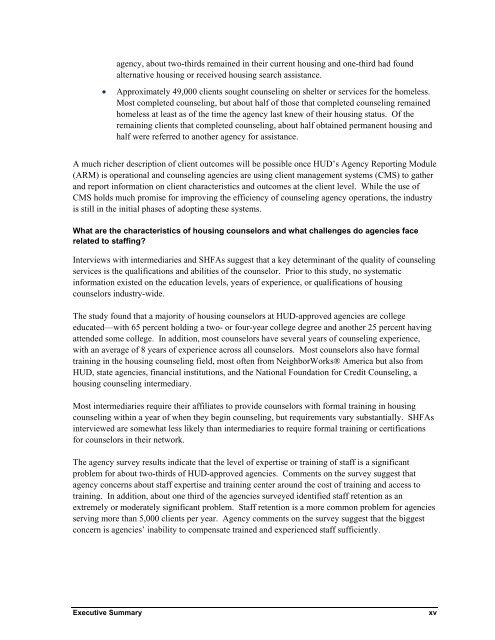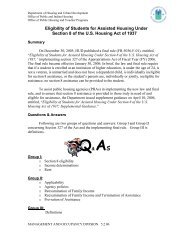Housing Counseling Process Evaluation and Design of ... - HUD User
Housing Counseling Process Evaluation and Design of ... - HUD User
Housing Counseling Process Evaluation and Design of ... - HUD User
You also want an ePaper? Increase the reach of your titles
YUMPU automatically turns print PDFs into web optimized ePapers that Google loves.
agency, about two-thirds remained in their current housing <strong>and</strong> one-third had found<br />
alternative housing or received housing search assistance.<br />
• Approximately 49,000 clients sought counseling on shelter or services for the homeless.<br />
Most completed counseling, but about half <strong>of</strong> those that completed counseling remained<br />
homeless at least as <strong>of</strong> the time the agency last knew <strong>of</strong> their housing status. Of the<br />
remaining clients that completed counseling, about half obtained permanent housing <strong>and</strong><br />
half were referred to another agency for assistance.<br />
A much richer description <strong>of</strong> client outcomes will be possible once <strong>HUD</strong>’s Agency Reporting Module<br />
(ARM) is operational <strong>and</strong> counseling agencies are using client management systems (CMS) to gather<br />
<strong>and</strong> report information on client characteristics <strong>and</strong> outcomes at the client level. While the use <strong>of</strong><br />
CMS holds much promise for improving the efficiency <strong>of</strong> counseling agency operations, the industry<br />
is still in the initial phases <strong>of</strong> adopting these systems.<br />
What are the characteristics <strong>of</strong> housing counselors <strong>and</strong> what challenges do agencies face<br />
related to staffing?<br />
Interviews with intermediaries <strong>and</strong> SHFAs suggest that a key determinant <strong>of</strong> the quality <strong>of</strong> counseling<br />
services is the qualifications <strong>and</strong> abilities <strong>of</strong> the counselor. Prior to this study, no systematic<br />
information existed on the education levels, years <strong>of</strong> experience, or qualifications <strong>of</strong> housing<br />
counselors industry-wide.<br />
The study found that a majority <strong>of</strong> housing counselors at <strong>HUD</strong>-approved agencies are college<br />
educated—with 65 percent holding a two- or four-year college degree <strong>and</strong> another 25 percent having<br />
attended some college. In addition, most counselors have several years <strong>of</strong> counseling experience,<br />
with an average <strong>of</strong> 8 years <strong>of</strong> experience across all counselors. Most counselors also have formal<br />
training in the housing counseling field, most <strong>of</strong>ten from NeighborWorks® America but also from<br />
<strong>HUD</strong>, state agencies, financial institutions, <strong>and</strong> the National Foundation for Credit <strong>Counseling</strong>, a<br />
housing counseling intermediary.<br />
Most intermediaries require their affiliates to provide counselors with formal training in housing<br />
counseling within a year <strong>of</strong> when they begin counseling, but requirements vary substantially. SHFAs<br />
interviewed are somewhat less likely than intermediaries to require formal training or certifications<br />
for counselors in their network.<br />
The agency survey results indicate that the level <strong>of</strong> expertise or training <strong>of</strong> staff is a significant<br />
problem for about two-thirds <strong>of</strong> <strong>HUD</strong>-approved agencies. Comments on the survey suggest that<br />
agency concerns about staff expertise <strong>and</strong> training center around the cost <strong>of</strong> training <strong>and</strong> access to<br />
training. In addition, about one third <strong>of</strong> the agencies surveyed identified staff retention as an<br />
extremely or moderately significant problem. Staff retention is a more common problem for agencies<br />
serving more than 5,000 clients per year. Agency comments on the survey suggest that the biggest<br />
concern is agencies’ inability to compensate trained <strong>and</strong> experienced staff sufficiently.<br />
Executive Summary xv
















